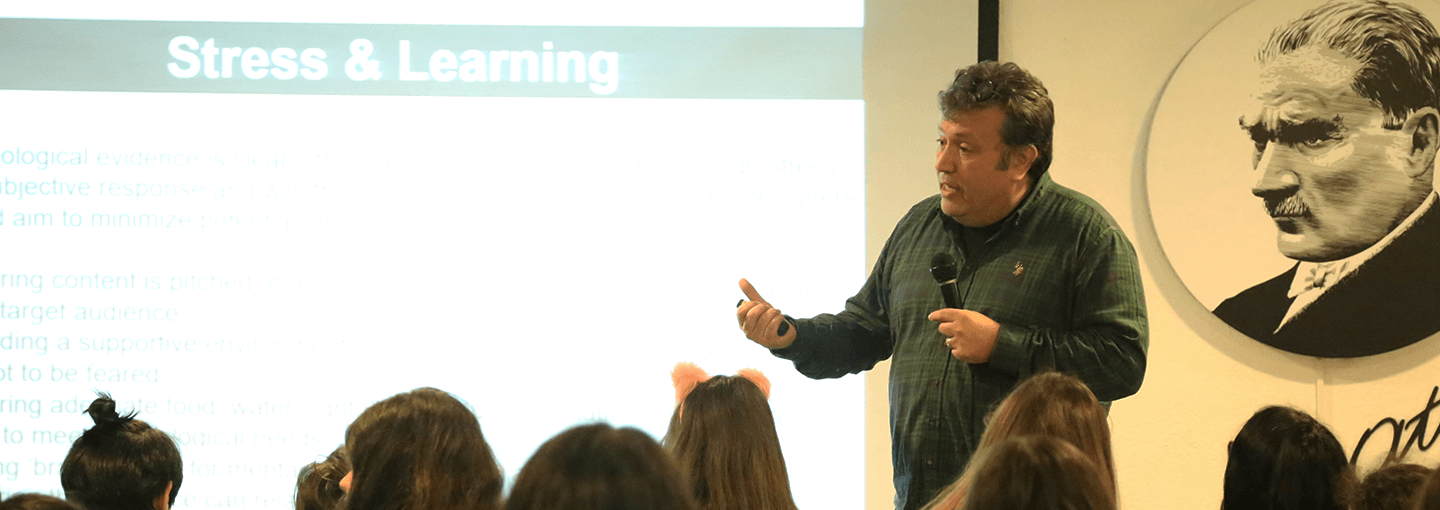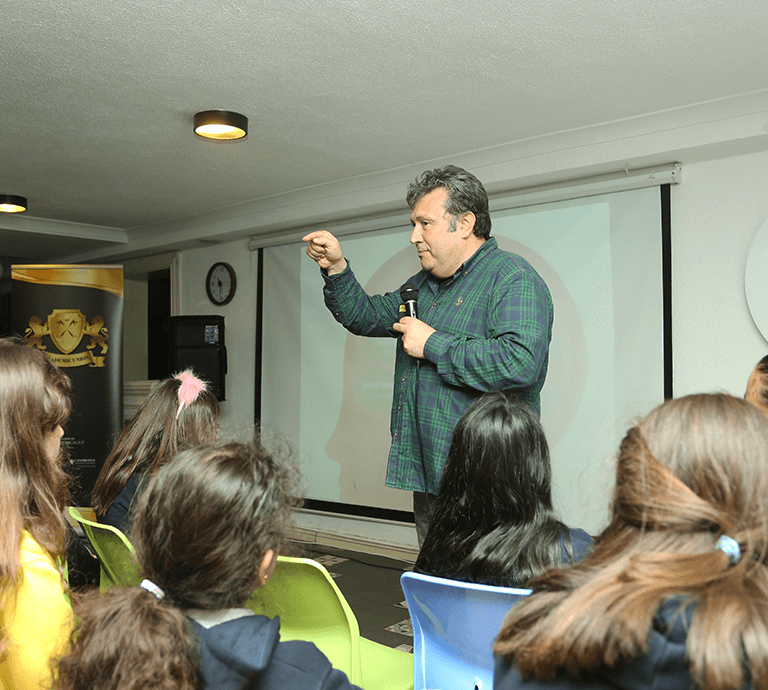Academic Union Seminar: How do we learn?
Prof. Soner Yıldırım (member of the Academic Union) from METU delivered another amazing seminar organised by Academic Union on the factors of learning.
During his seminar to TBS Middle and High School students, Prof. Yıldırım talked about the definition, the steps of learning, how the brain acts on the process of learning, what intelligence means and gave tips to better learning and memorising.
"Everyone and every brain has its own unique learning habits" said Prof. Yıldırım and "reacts to note taking, rehearsing, drawing, writing, listening, watching and observing. These conditions apply differently to every brain on the learning process".
Prof. Yıldırım: The quality of our blood has a major role in learning. The make up of our blood such as oxygen, nutrition, glucose etc, are the factors directly influencing the process of learning. Our brain uses more than 1000 litres of blood in a day.
“Exercise the body to activate the brain!” – Prof. Soner Yıldırım (Middle East Technical University)
The Seminar Programme featured:
- How brain functions on the learning process:
- Neosinaps
- Neurons: A single neuron can achieve nothing - it takes many thousands combined to generate every action, thought or memory we have. Neurons therefore, need to relate to other neurons. They achieve this by sending electrical signals along their axon, which, upon reaching a threshold, release neurochemicals into the gap, or synapse, between two neurons.
- If the dendrites of the receiving neuron have the appropriate chemical receptors, a connection will be formed that results in the receiving neuron firing its own electrical charge, which will be received by yet another neuron and, so, on goes the flow.
- Attention
- Attention requires focused concentration and is a prerequisite for neurons to be activated and neural networks to be forged. Forging new networks is energy-intensive and our brains are not designed to remain attentive for long periods of time. The brain needs down-time at regular intervals to rest and refocus. During this time, it is also strengthening the newly-formed connections. When we push ourselves to focus beyond our natural limits, our concentration wanes, which is our brain’s way of forcing a break and we catch ourselves daydreaming.
- When we pay attention, memories are formed, stored and recalled in a complex process that engages numerous regions of the brain. Without memory, there is no learning.
- Memory is typically described as a three-part process of encoding, storage and retrieval. Incoming data is held in short term, or working, memory and will be quickly lost if not consolidated. How well we encode a memory is critical to how effectively we will be able to recall it at a future point. Failure to learn can be a function of shortcomings at any of the three stages in the memory process.
- Neosinaps
- Under what conditions are learning outcomes optimized?
- Holistic learning recognizes that the brain not only interacts with incoming information, but with the entire context in which it is presented. To this end, our learning environment must address the physical, cognitive and emotional elements in that environment.
- Physical
- Nutrition, blood, oxygen, glucose etc.
- Sleep
- Cognitive
- Exercising our cognitive ‘muscle’ by building more and advanced neural networks is core to our mental fitness and also acts as a barrier to cell atrophy in later life.
- Emotional
- Emotions are integral to thinking and learning.
- Stress
- The biological evidence is clear: stress and learning do not mix. Although stress is a subjective response.
- The biological evidence is clear: stress and learning do not mix. Although stress is a subjective response.
- Physical
- Holistic learning recognizes that the brain not only interacts with incoming information, but with the entire context in which it is presented. To this end, our learning environment must address the physical, cognitive and emotional elements in that environment.
- Intelligence
- Several themes in contemporary understandings of intelligence:
- Factor theories (Spearman, Guildford, Cattell, Thurstone, Carroll, Gardner);
- Cognitive processing (Binet and Terman, Wechsler, Cattell, Sternberg);
- Adaptation to the environment (Binet, Wechsler, Sternberg, Gardner);
- Relationship to culture (Binet, Sternberg, Gardner).
- The sources of intelligence: nature or nurture?
- Nature, parenting, school?
- Several themes in contemporary understandings of intelligence:
Who is Prof. Soner Yıldırım?
Prof. Soner Yıldırım completed his bachelor’s degree at Hacettepe University, Faculty of Education, Department of Educational Sciences, Division of Curriculum and Instruction in 1990. He completed his masters program at Michigan State University in 1993 and then his doctorate program at University of Southern California in 1997 in the field of Instructional Technology. He has been working at the Middle East Technical University (METU), Faculty of Education as a faculty member since 1998.
Prof. Yildirim has been serving as international ICT consultant in various international organisations. He worked for the World Bank as an international expert in several Educational Technology projects. Between 2002-2006, he was the leading expert at the Council of Europe in Strasbourg for the project “Teaching & Learning in the Communication Society”. He has also been working as the National Expert for the European Training Foundation (ETF) for Vocational Education and Training (VET) projects.
Prof. Yildirim’s research interest includes technology use in education, social media, electronic performance support systems (EPSS), learning analytics and nomophobia.















